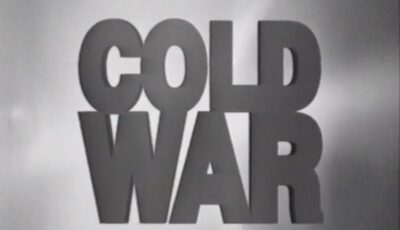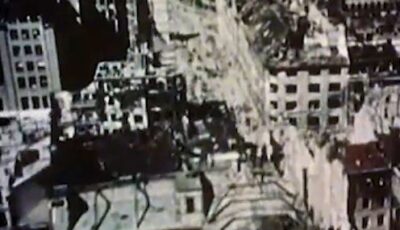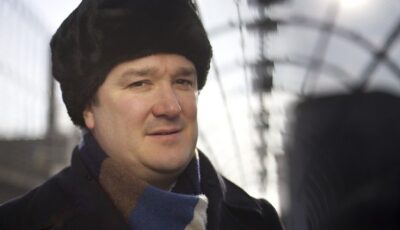Synopsis
The United States nuclear strategy of counterforce, intended to counter a Soviet conventional attack by targeting military facilities, is discredited following the Cuban Missile Crisis. Instead Defence Secretary McNamara adopts the doctrine of Mutually Assured Destruction (MAD), with the belief that the targeting by the superpowers of each other's cities would deter a nuclear war. Both sides step up nuclear testing and acquire more nuclear weapons, in particular submarines capable of unleashing retaliation should the opponent strike first. The Soviets choose to follow a more defensive doctrine and introduce anti-ballistic missiles, which the United States seek to counter with multiple independently targetable re-entry vehicles. The arms race remains expensive, controversial and, as demonstrated in the Palomares incident, not without risk. However some small promise of arms control comes from the SALT Treaty. Interviewees include Russell E. Dougherty, William Kaufmann and Harold Brown. The pre-credits scene has McNamara explaining how MAD was the foundation for deterrence.
- Programme: Cold War
- Episode: 12: MAD: 1960-1972
- Channel: BBC Two
- Broadcast year: 1998
- History | The Cold War
Licence: ERA Licence required
UK only
Staff and students of licensed education establishments only
Cannot be adapted
Add Notes
More clips from Cold War

10: Cuba: 1959-1962 | Cold War
10: Cuba: 1959-1962 | Cold War
Fidel Castro comes to power following the Cuban Revolution. Cuba aligns itself with the Soviet Union and the government starts nationalising A...

11: Vietnam: 1954-1968 | Cold War
11: Vietnam: 1954-1968 | Cold War
After losing the Battle of Dien Bien Phu the French leave Vietnam. A stream of refugees flee to the south after the Communist north institu...

14: Red Spring: 1960s | Cold War
14: Red Spring: 1960s | Cold War
Likewise the Soviet Union started the decade with growing openness and optimism. There was also an emerging cohort of youth with no memory o...

15: China: 1949-1972 | Cold War
15: China: 1949-1972 | Cold War
Following the Chinese Revolution Mao Zedong aligns China firmly with the Soviet Union. China becomes the recipient of Soviet aid, supports Co...

16: Détente: 1969-1975
16: Détente: 1969-1975
Nixon builds closer relations with China and the USSR, hoping to leverage an honourable US exit from Indochina. The Soviet Union is fearful of a US-C...

17: Good Guys, Bad Guys: 1967-1978 | Cold War
17: Good Guys, Bad Guys: 1967-1978 | Cold War
Under Détente the superpowers continued their rivalry, but carefully avoided direct conflict by courting allies in the developi...

18: Backyard: 1954-1990 | Cold War
18: Backyard: 1954-1990 | Cold War
The United States saw the emergence of leftist movements in different Latin American countries as threatening to its commercial interests,...

19: Freeze: 1977-1981 | Cold War
19: Freeze: 1977-1981 | Cold War
Carter's ambitious proposals for total multilateral nuclear disarmament are rejected by Brezhnev; his championing of human rights does not w...

2: Iron Curtain: 1945-1947 | Cold War
2: Iron Curtain: 1945-1947 | Cold War
The wartime allies demobilise - the United States enjoys its economic strength and resurgence while Britain and the rest of Europe is e...

20: Soldiers of God: 1975-1988 | Cold War
20: Soldiers of God: 1975-1988 | Cold War
Nur Mohammad Taraki comes to power in Afghanistan and attempts to modernise the country on Marxist-Leninist lines, provoking a rebe...

21: Spies: 1944-1994 | Cold War
21: Spies: 1944-1994 | Cold War
Throughout the Cold War both sides sought intelligence about their opponents using spies, satellites and other means. For political reasons, ...

22: Star Wars: 1981-1988 | Cold War
22: Star Wars: 1981-1988 | Cold War
Reagan's 1983 ''Evil Empire'' speech sets the tone for a more aggressive US posture against the Soviet Union, and the costly arms race is...

23: The Wall Comes Down: 1989 | Cold War
23: The Wall Comes Down: 1989 | Cold War
Gorbachev makes clear Eastern European countries were free to determine their own destinies. In Poland Solidarity enters into negoti...

3: Marshall Plan: 1947-1952 | Cold War
3: Marshall Plan: 1947-1952 | Cold War
For both altruistic and self-serving purposes, the United States provides massive grants of aid to the countries of Europe in the form...

4: Berlin: 1948-1949 | Cold War
4: Berlin: 1948-1949 | Cold War
By 1947, the United States placed as a high priority the revival of the German economy, an approach opposed by the Soviet Union. After the in...

5: Korea: 1949-1953 | Cold War
5: Korea: 1949-1953 | Cold War
Korea after the Second World War was occupied by both the Soviets and the Americans, who respectively installed Kim Il Sung and Syngman Rhee a...

6: Reds: 1948-1953 | Cold War
6: Reds: 1948-1953 | Cold War
The fears the leadership of both sides had were projected inwards towards their own people. In the United States the House Committee on Un-Amer...

7: After Stalin: 1953-1956 | Cold War
7: After Stalin: 1953-1956 | Cold War
Nikita Khrushchev becomes Soviet leader after the death of Stalin. Khrushchev rolls back a number of oppressive measures that existed u...

8: Sputnik: 1949-1961 | Cold War
8: Sputnik: 1949-1961 | Cold War
As a consequence of the atomic spies, the Soviet Union joined the nuclear club, and the two superpowers compete to develop their nuclear ars...

9: The Wall: 1958-1963 | Cold War
9: The Wall: 1958-1963 | Cold War
West Germany, and West Berlin, become more affluent, prompting a surge of East Germans to cross the borders in Berlin, kept open under the ...
More resources about The Cold War

1: Berlin 1945-48 | History File
1: Berlin 1945-48 | History File
Compilation of secondary schools programme about the Cold War, featuring Berlin Crisis, Hungarian Uprising, rise of Soviet leader Nikita Khr...

4: Cuban Missile Crisis 1962 | History File
4: Cuban Missile Crisis 1962 | History File
Compilation of secondary schools programme about the Cold War, featuring Berlin Crisis, Hungarian Uprising, rise of Soviet leader...

1: Deja Vu (1858-1961) | The Vietnam War
1: Deja Vu (1858-1961) | The Vietnam War
Revolutionaries led by Ho Chi Minh end French colonial occupation. Vietnam is divided in two at Geneva.

2: Iron Curtain: 1945-1947 | Cold War
2: Iron Curtain: 1945-1947 | Cold War
The wartime allies demobilise - the United States enjoys its economic strength and resurgence while Britain and the rest of Europe is e...

4: Berlin: 1948-1949 | Cold War
4: Berlin: 1948-1949 | Cold War
By 1947, the United States placed as a high priority the revival of the German economy, an approach opposed by the Soviet Union. After the in...

9: The Wall: 1958-1963 | Cold War
9: The Wall: 1958-1963 | Cold War
West Germany, and West Berlin, become more affluent, prompting a surge of East Germans to cross the borders in Berlin, kept open under the ...

Cold War
Cold War
Both the United States and the Soviet Union drifted apart after the Russian Revolution of 1917, the Russian Civil War and the Paris Peace Conference. Diplomatic and...

12: Mr Kennedy and Mr Khruschev | Twentieth Century History
12: Mr Kennedy and Mr Khruschev | Twentieth Century History
The contest between the United States and the Soviet Union between 1961 and 1963 leading to the Cuban Missile Cri...

14: Red Spring: 1960s | Cold War
14: Red Spring: 1960s | Cold War
Likewise the Soviet Union started the decade with growing openness and optimism. There was also an emerging cohort of youth with no memory o...

3: Hell Come to Earth (January 1964-December 1965) | The Vietnam War
3: Hell Come to Earth (January 1964-December 1965) | The Vietnam War
With South Vietnam in chaos, Hanoi hardliners seize the initiative and send combat troops.

22: Star Wars: 1981-1988 | Cold War
22: Star Wars: 1981-1988 | Cold War
Reagan's 1983 ''Evil Empire'' speech sets the tone for a more aggressive US posture against the Soviet Union, and the costly arms race is...

S1E5: The Fall of the Berlin Wall | Days That Shook the World
S1E5: The Fall of the Berlin Wall | Days That Shook the World
Exploring the fall of the Berlin Wall in 1989 from the perspective of a Checkpoint Charlie Stasi guard commander.

S2E9: Cold War Spies: 1960 U-2 incident | Days That Shook the World
S2E9: Cold War Spies: 1960 U-2 incident | Days That Shook the World
This program focuses on the shooting down of the US U-2 spy plane in 1960.

The Looking Glass War | Strange Days: Cold War Britain
The Looking Glass War | Strange Days: Cold War Britain
Dominic Sandbrook examines the Cold War years, looking at the frontline of the conflict as consumerism was pitched aga...

Threads
Threads
Grim drama telling the story of a nuclear strike on Britain through the eyes of two families, tracing the events leading up to the War and the decade of devastation ...

11: Vietnam: 1954-1968 | Cold War
11: Vietnam: 1954-1968 | Cold War
After losing the Battle of Dien Bien Phu the French leave Vietnam. A stream of refugees flee to the south after the Communist north institu...

16: Détente: 1969-1975
16: Détente: 1969-1975
Nixon builds closer relations with China and the USSR, hoping to leverage an honourable US exit from Indochina. The Soviet Union is fearful of a US-C...

2: Hungary 1956 | History File
2: Hungary 1956 | History File
Compilation of secondary schools programme about the Cold War, featuring Berlin Crisis, Hungarian Uprising, rise of Soviet leader Nikita Khrus...

3: Marshall Plan: 1947-1952 | Cold War
3: Marshall Plan: 1947-1952 | Cold War
For both altruistic and self-serving purposes, the United States provides massive grants of aid to the countries of Europe in the form...

4: 1951 Korea | Peter and Dan Snow: 20th Century Battlefields
4: 1951 Korea | Peter and Dan Snow: 20th Century Battlefields
Peter and Dan Snow, at the border between North and South Korea, tell of two key moments in the years of fighti...
